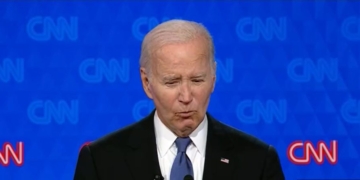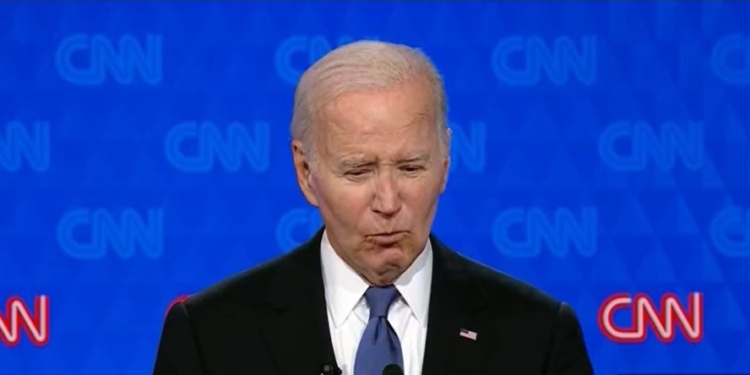When the 69-year-old former governor of California ran for president in 1980, his political adversaries and the establishment media often focused on the same theme: Ronald Reagan was “too old.”
Gannett News Service published a story in February that explained how George H.W. Bush — who was running against Reagan for the Republican nomination — would make Reagan’s age an issue.
“George Bush won’t come right out and say Ronald Reagan is too old and decrepit to be president,” reported Gannett.
“But you can’t miss the drift,” it said.
When a person in New Hampshire asked Bush if “69 is too old to be president,” Gannet reported, Bush responded: “I intend to serve two full terms.”
“The point is pretty clear,” reported Gannett. “George Bush is 55 and Ronald Reagan is 69. Bush doesn’t have to tell you to add the eight years of two terms in office to Reagan’s 69 and see how old that is.”
After Reagan defeated Bush for the Republican nomination, syndicated columnist Jack Anderson reported that “the subliminal message in the Carter campaign, sources say, will be that Reagan is too old and tired to handle the grueling tasks required of a president.”
An Associated Press story published on Sept. 16, 1980, carried this first paragraph: “It was Ronald Reagan’s day to be the whipping boy of the 1980 presidential campaign. Jimmy Carter said the Republican might ’embarrass’ the nation and [independent candidate] John Anderson suggested Reagan could be just too old for the job.”
Reagan did not get whipped, however. Carter did.
Reagan won the popular vote by more than 8 million, took 44 states and beat Carter 489 to 49 in the Electoral College.
In his first year in office, Reagan moved a tax-cut bill through a Democrat-controlled House of Representatives — and signed it into law on Aug. 13, 1981.
Three years later, he ran for reelection — at the age of 73.
Once again, his adversaries and the media argued he was “too old.”
“Reagan is too old and he knows that,” wrote columnist Charley Reese in January 1984.
A month before the 1984 election — after Reagan’s first debate with Sen. Walter Mondale, the Democratic candidate — columnist Jimmy Breslin argued that Reagan (who was putting in place the policies that won the Cold War) was too old to be trusted with nuclear missiles.
“And we live in a country where the man in charge of missiles barely could stand on his feet for 90 minutes in a debate because he was too old and shaking too much,” said Breslin. “He now asks to be left in charge of nuclear missiles through all of the next four years. We all saw him on Sunday night. The year was 1984. Picture what he might be like in 1988.”
Two weeks later in his second debate with Mondale, Reagan cleverly countered those who criticized his age. “I want you to know that also I will not make age an issue in this campaign,” he said. “I am not going to exploit, for political purposes, my opponent’s youth and inexperience.”
During that 1984 election year, did the 73-year-old President Reagan try to avoid prolonged encounters with an antagonistic media? No.
The American Presidency Project has gathered data on the “modern” press conferences held by presidents since 1953.
“The modern idea of a press conference dates from the Eisenhower Administration,” says the project. “In those modern conferences, the President responds to nominally un-vetted questions in a public forum, and the event is nationally broadcast.”
The project further distinguishes between what it calls “solo-reg” press conferences and “joint” conferences.
“‘Solo-reg’ refers to a conference with the President, alone,” it says. “A variant of the Solo category, but tallied separately … is ‘Prime-Time.’ Those conferences have been televised, live, in prime-time (Eastern Time).”
Then there are “joint” conferences. In these, the president “appears together with one or more non-U.S. speakers.’”
How many solo press conferences did the 73-year-old Reagan hold in 1984? He held five — and they all were in prime time and before the election. The first, as reported by the Ronald Reagan Presidential Library, was on Feb. 22 of that year; the second was on April 4; the third was on May 22; the fourth was on June 14; and the fifth was on July 24.
How many solo press conferences has Biden held so far in 2024? Zero.
According to both the White House website and the list compiled by the American Presidency Project, Biden has held three joint press conferences this year with foreign leaders.
On April 10, he stepped into the Rose Garden with Japanese Prime Minister Kishida Fumio — and responded to eight questions. On May 23, he had a press conference with Kenyan President William Ruto in the East Room — and responded to six questions.
On June 13, Biden had a press conference with Ukrainian President Volodymyr Zelenskyy at the Hotel Masseria San Domenico in Fasano, Italy.
Biden, according to the White House transcript, started that conference by stating: “We’re each going to take … a question each from two American reporters and a question each from two Ukrainian supporter — reporters.”
White House press secretary Karine Jean-Pierre announced on Tuesday that Biden would give a press conference next week at the NATO summit in Washington, D.C. If he actually does, a reporter should ask him why he would confuse “supporters” with “reporters.”
Terence P. Jeffrey is the investigative editor of the Daily Caller News Foundation. To find out more about Terence P. Jeffrey and read features by other Creators Syndicate writers and cartoonists, visit the Creators Syndicate website at www.creators.com.
The views and opinions expressed in this commentary are those of the author and do not reflect the official position of the Daily Caller News Foundation.
(Featured Image Media Credit: Screen Capture/CSPAN
All content created by the Daily Caller News Foundation, an independent and nonpartisan newswire service, is available without charge to any legitimate news publisher that can provide a large audience. All republished articles must include our logo, our reporter’s byline and their DCNF affiliation. For any questions about our guidelines or partnering with us, please contact [email protected].


























